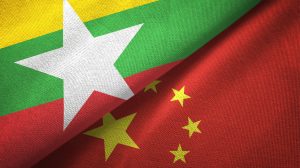Myanmar’s opposition National Unity Government (NUG) has issued its first formal policy statement on China, vowing to safeguard Chinese economic investments and enterprises as resistance forces continue to make gains in regions close to the Chinese border.
In a 10-point statement released on Monday, the NUG pledged a broad continuity with the partnership established by the National League for Democracy (NLD)-led government, which was overthrown by the military in February 2021.
“Myanmar regards the People’s Republic of China as a specifically important country, not only for close, profound historical ties between the two countries but also for China’s status as a global superpower,” it stated, adding that the NUG “endeavors to be a good neighbor to China.”
Specifically, the NUG added that “measures will be taken to safeguard Chinese economic investments and other socio-economic enterprises within Myanmar,” and that it would not permit any organization to establish a presence in Myanmar that “poses a threat to the national security of neighboring countries.” In a similar vein, the NUG said that it remains “committed to engaging in close cooperation with China and other countries in the region to combat transnational crimes, including online scams and gambling, human trafficking and drug-related activities.”
The NUG, which was formed shortly after the coup by elected lawmakers of the ousted NLD government and their allies, said also said that it “remains committed to upholding its obligations under any treaties or agreements” signed between the two countries prior to the coup. The NUG also stated, in an artful passive register, that Beijing’s “One China principle,” which asserts its sovereign claim over Taiwan, “will be upheld and supported in a sustained manner.”
The NUG’s publication of a formal policy statement toward Myanmar’s large northern neighbor is probably connected to the continued progress of Operation 1027, a resistance offensive that has targeted junta strongholds across northern Shan State close to the border with China’s Yunnan province.
Since the offensive was launched in late October, the alliance has seized more than 400 junta outposts and bases, overrun a dozen towns, and captured vital trade routes with China, including five border gates in northern Shan State. The fighting has disrupted overland trade and prevented the development of large China-backed infrastructure projects, prompting China to step in to mediate the conflict, so far unsuccessfully.
For some observers, especially among those inclined to view the region and world as a dyadic opposition of democracies and authoritarian states, the NUG’s position, especially on Taiwan, might seem surprising. But the shadow government’s stance reflects in its broad terms the position of Aung San Suu Kyi’s NLD government between 2016 and 2021, which saw significant advances in China-Myanmar relations.
This includes the pledge of support for Beijing’s “One China principle.” During Aung San Suu Kyi’s visit to Myanmar in August 2016, the Chinese Foreign Ministry readout stated, “Myanmar reiterated that it sticks to the One-China policy, understands and supports China’s stance on the Taiwan issue, Tibet-related issues and Xinjiang-related issues.”
It is true that the military coup has changed much in Myanmar, casting doubt on many old shibboleths, not least the invincibility of the Myanmar armed forces. It is also true that China’s bald support for the junta – in April 2022, China’s Foreign Minister Wang Yi pledged Beijing’s support for the military government, “no matter how the situation changes” – has been a subject of considerable public anger in Myanmar.
As the NUG stated the same month in response to Wang’s remark, China’s partnership with “an illegitimate and genocidal regime risks serious damage” to China’s international reputation. The NUG warned that the people of Myanmar would “soundly reject any efforts by foreign governments to establish such a partnership with the illegitimate military regime.”
But the changes inside Myanmar have not been matched by changes to the geopolitical realities of the region in which the nation sits. China’s economic dynamism and geographic proximity to Myanmar – to say nothing of its deep relations with armed rebel groups in the borderlands – tightly delimit what options any Myanmar governments can take toward Beijing. It is tempting to assume that China’s support for the military junta will harm its relationship with any democratic government that may emerge in future, but like the NLD administration before it, an NUG-led government would be in no position to spurn its large northern neighbor.
In this eventuality, China’s acquiescence would be vital, and its economic resources would be important to the rebuilding of Myanmar’s economy and the setting of the new federal democracy on firm foundations. It thus makes sense to assure Beijing that its core interests would not be harmed – indeed, might well benefit – from the victory of Myanmar’s resistance forces.
As Angshuman Choudhury of India’s Center for Policy Research put it on X (formerly Twitter), the NUG “needs to be understandably tactical,” given the current context within the country. “But this just shows the great degree of leverage Beijing has on #Myanmar.”
Indeed, the NUG’s statement is a reminder that whatever the mercenary nature of China’s policy toward Myanmar, geographic propinquity and economic vitality ensures that it will be an important partner and player in the country – no matter what government rules in Naypyidaw.
As the NUG’s statement put it, China and Myanmar are “neighboring countries with a shared border spanning over two thousand kilometers.” They are therefore “bound to coexist as long as the Earth endures.”
































